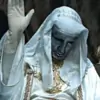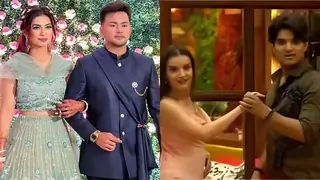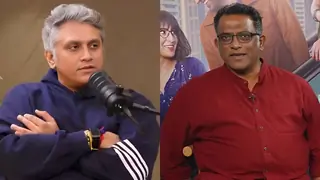Originally posted by: gatheringstorm
So why not publish a paper or write an article on it?? Why make distasteful slogans demanding India be broken up.And what about the families of those security personnel who were martyred in that attack on the Parliament?? Should our empathy not lie with them too?? Its a shame that a time has come when in the name of intellectual pursuit terrorists are being sympathised with on whose guilt a majority judgement was passed by the courts. SMHAs for the verdict, this is what I foundSupreme Court termed Afzal Guru a "menace to the society" while taking away his right to life
In its 271-page judgement delivered on August 4, 2005, a division bench had said there was clinching evidence against Afzal Guru regarding his nexus with the terrorists who carried out the attack on Parliament in 2001.
New Delhi, February 9, 2013 | UPDATED 20:03 ISTA +A -The Supreme Court had while upholding Afzal Guru 's death sentence had termed the attack on Parliament in 2001 as an unparalelled assault on the supreme seat of democracy.
In its 271-page judgement delivered on August 4, 2005, a division bench of Justice P V Reddi and Justice P P Naolekar had said there was clinching evidence against Gururegarding his nexus with the terrorists who carried out the "terrorist act of most diabolical nature".
There was not even a shred of doubt about his complicity in hatching of the criminal conspiracy to attack Parliament and evidence showed that he had actively participated in its execution, it said.
"All evidences unerringly point to Afzal Guru, a key conspirator, who played an active role", the Bench said observing that by no standards his act could be termed innocuous.
"He is definitely involved in the conspiracy to attack Parliament with the use of explosive substances," Justice Reddi said observing that the attack had no parallel in the history of Indian democracy.The Delhi High Court had upheld the death penalty to Afzal Guru.
While justifying the imposition of capital punishment on Guru, Justice Reddi had said the attack on Parliament was "a gravest crime of enormous severity" and was a classic case falling under the "rarest of rare" category.
"The collective conscience of the society will be satisfied only if the death penalty is awarded to Afzal Guru," the Bench had said.
While taking away his right to life, the court had said the manner in which he conspired to wage war against the nation and the support he extended for carrying out the criminal conspircay made him a "menace to the society".
The trial Court had awarded death penalty to Shaukat, Guru and Geelani while sentencing Afsan to five years imprisonment for their role in the December 13, 2001 terrorist attack on Parliament which had led to mobilisation of troops on the Indo-Pak border and brought the two countries on the brink of war.
The Delhi High Court had upheld the death penalty to Afzal and Shaukat under Sections 302 (murder), 121 (waging war against the nation) and Sections 3(2) and 4 of POTA but had acquitted both Geelani and Afsan.http://indiatoday.intoday.in/story/supreme-court-afzal-guru-hanging-parliament-attack-case/1/249630.html
NATIONAL
NEW DELHI, February 10, 2013Updated: February 10, 2013 02:34 ISTThe case against Afzal
Supreme Court noted that terrorists made phone calls to him minutes before Parliament attack
Phone calls made by Fidayeen' terrorists to Afzal Guru minutes before the attack on Parliament coupled with circumstantial evidence proved beyond reasonable doubt that he played an active part in the conspiracy, the Supreme Court had said.
The apex court, in its August 2005 verdict, had noted that just before the attack on Parliament on December 13, 2001, Guru had received calls on his mobile phone from one of the terrorists Mohammed " at 10:43 AM, 11:00 AM and 11:25 AM.
The bench said transcripts of the call details established that Mohammed had told Guru that he and the others were going to execute the plan.
The bench also took into consideration that Guru was instrumental in providing hideout and accommodation to the terrorists at Gandhi Vihar and Indira Vihar in north Delhi, and played a key role in arranging the logistics such as the purchase of chemicals used for preparing the explosives.
Guru had also identified the bodies of five terrorists, Mohammed, Haider, Hamza, Rana and Raja, killed during the gun battle by the security personnel inside Parliament complex.
The court had noted that the evidence had established that Afzal Guru was in contact with the terrorists and three other accused " S. A. R. Geelani, the Delhi University college lecturer, his cousin Shaukat Hussain Guru, and Afsan Guru alias Navjot Sandhu.
"As is the case with most of the conspiracies, there is and could be no direct evidence of the agreement amounting to criminal conspiracy. However, the circumstances cumulatively considered and weighed, would unerringly point to the collaboration of the accused Afzal Guru with the slain Fidayeen' terrorists. The circumstances, if considered together, as it ought to be, establish beyond reasonable doubt that Afzal Guru was a party to the conspiracy and had played an active part in various acts done in furtherance of the conspiracy," a bench comprising Justice P. V. Reddi and Justice P. P. Naolekar had said in the judgement.
http://www.thehindu.com/news/national/the-case-against-afzal/article4397845.ece
P.S. I don't see where the verdict of the Supreme Court hinted at his innocence, the only point of debate was whether he should have been awarded the death sentence because he was a planner and conspirator and not the excecutor of the attack. Also the other debate was on how he was hanged without sufficient intimation to his family. His culpability according to the SC was proven beyond doubt.
































10